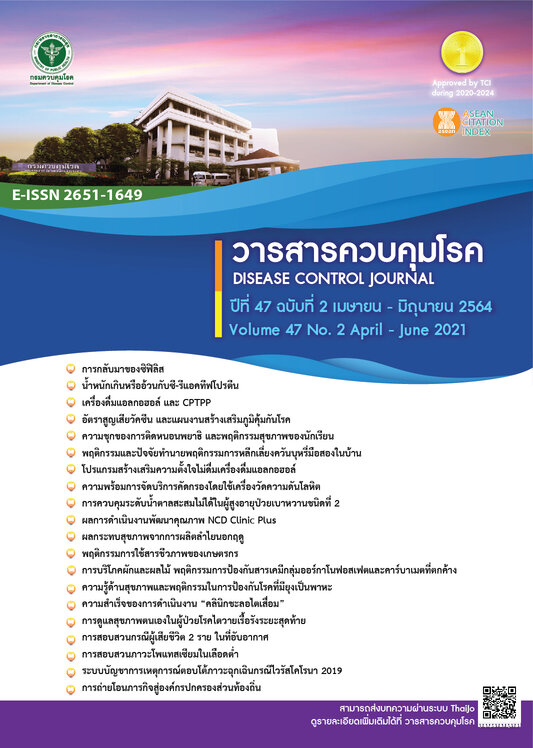Factors associated with the success of Kidney Clinic operations
DOI:
https://doi.org/10.14456/dcj.2021.32Keywords:
Chronic Kidney Disease Clinic (CKD Clinic), assessment, successAbstract
This study investigates the factors associated with the successful implementation of the “chronic kidney disease clinic (CKD clinic)” in the hospitals and also identify the appropriate implementation models of the “CKD clinic” as the policy guidelines for the provision of effective treatments to patients with chronic kidney disease. The assessment is divided into 3 parts: a) the evaluations of the treatment of chronic kidney disease conducted in 79 hospitals; b) the assessment of behaviors related to food consumption and drug use among 427 chronic kidney disease patients in hospitals; and c) the identification of factors affecting the success of the operation "CKD clinic”. The study was conducted from February to September 2019. Data were analyzed using basic statistical methods and multiple regression analysis. The results show that the CKD clinics with clear treatment plans were associated with the reduction of the stage of the kidney disease among these patients (p-value<0.05). In addition, providing additional services from the regular services provided by the Ministry of Public Health is another option to help patients to reduce the progression of renal insufficiency, such as proactive integration of community services, establishment of Rak tai (kidney care) community or organizing community activities for groups that cannot control estimated glomerular filtration rate (eGFR) values. Although most hospitals had policy directions and clear purpose to establish the CKD clinic, 60.8% of them had insufficient budget. Therefore, supporting various resources including budgets along with issuing policies will support the hospitals to operate more efficiently services in the CKD clinics.
Downloads
References
World Health Organization. Noncommunicable diseases country profiles 2018. Geneva: World Health Organization; 2018.
World Health Organization. Noncommunicable diseases progress monitor 2017. Geneva: World Health Organization; 2017.
The Nephrology Society of Thailand. Clinical practice recommendation for the evaluation and management of chronic kidney disease in adults 2015. Bangkok: The Nephrology Society of Thailand; 2015. (in Thai)
Health Administration Division. Criteria for establishing and adjusting the potential level of health care units. Bangkok: Office of Permanent Secretary Ministry of Public Health; 2018. (in Thai)
Division of Non-Communicable Diseases. Operation manual for CKD reduction in diabetes and high blood pressure. Nonthaburi: Department of Disease Control; 2016. (in Thai)
Srivanichakorn S. Management of chronic diseases in the community “The 7th Community Health System Development Forum”. Nonthaburi: Office of Community Based Health Care Research and Development, ASEAN Institute for Health Development, Mahidol University; 2012. (in Thai)
Bhumirajanagarindra Kidney Institute. Knowledge of nephrology for people. Bangkok: Bhumirajanagarindra Kidney Institute Hospital; 2014. (in Thai)
The Nephrology Society of Thailand. Guide for citizens: How to prevent kidney failure. Bangkok: National Health Security Office (NHSO); 2016. (in Thai)
Taptagaporn S, Mongkolsomlit S, Kaewdok T, Wattanasoei S, Rakkapao N. Evaluation and lesson distilled on implementation of Chronic Kidney Disease clinic, under policy of Ministry of Public Health. Pathum Thani: Faculty of Public Health, Thammasat University; 2017 (in Thai).
Wungrath J, Rerkkasem K, Saengyo S, Pongtam S, Pinmars N. Factors predicting food consumption behavior of hemodialysis patients with end stage renal disease at maharaj nakorn chiangmai hospital. Journal of Health Systems Research. 2018;12:625-35.
Aekplakorn W, editor. Thai national health examination survey, NHES V. Nonthaburi: Health Systems Research Institute; 2014. (in Thai).
Division of Non-Communicable Diseases, CVD CKD detection and prevention control Package: Department of Disease Control. Nonthaburi: Bureau of Non-Communicable Diseases; 2017. (in Thai)
Downloads
Published
How to Cite
Issue
Section
License
Articles published in the Disease Control Journal are considered as academic work, research or analysis of the personal opinion of the authors, not the opinion of the Thailand Department of Disease Control or editorial team. The authors must be responsible for their articles.






